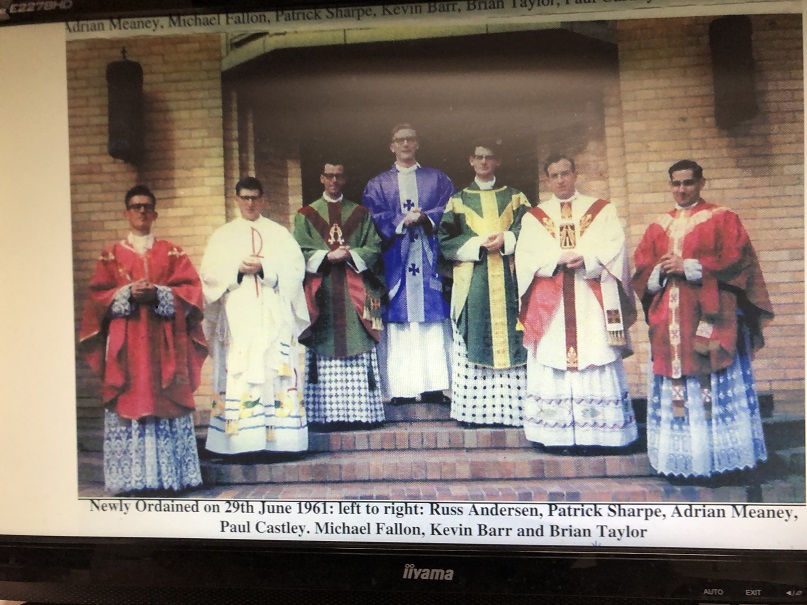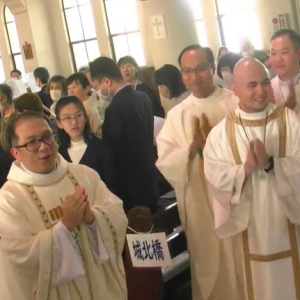Peter MALONE
May 30th, Acknowledging Patrick Sharpe MSC, 90.
May 30th, Acknowledging Patrick Sharpe MSC, 90.
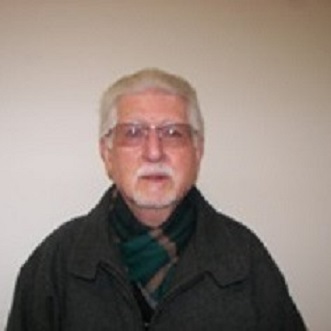
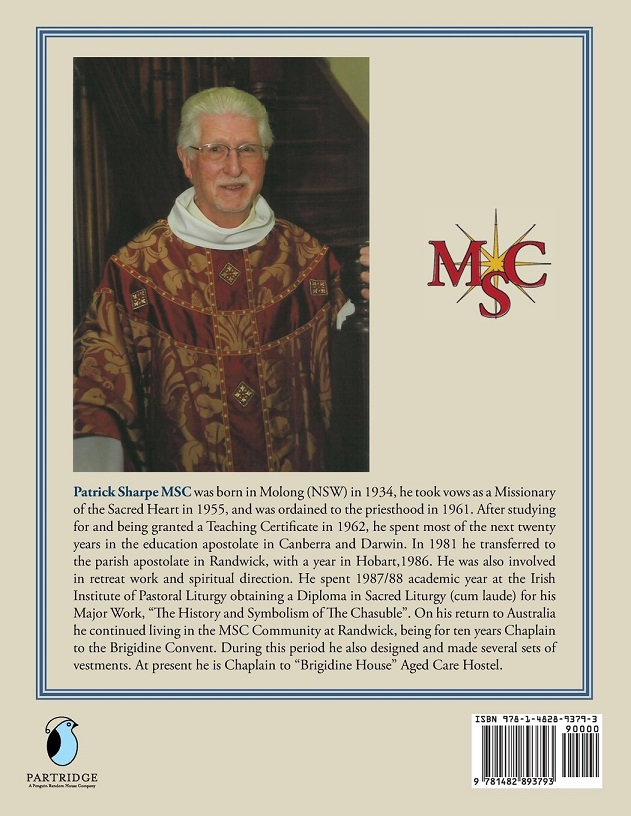
Memories, Ordination 1961
Daramalan College, Canberra, the Sharpe Wing and the Sharpe Quad
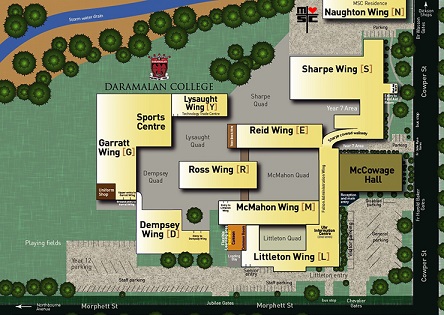
And the cover of his book of poems
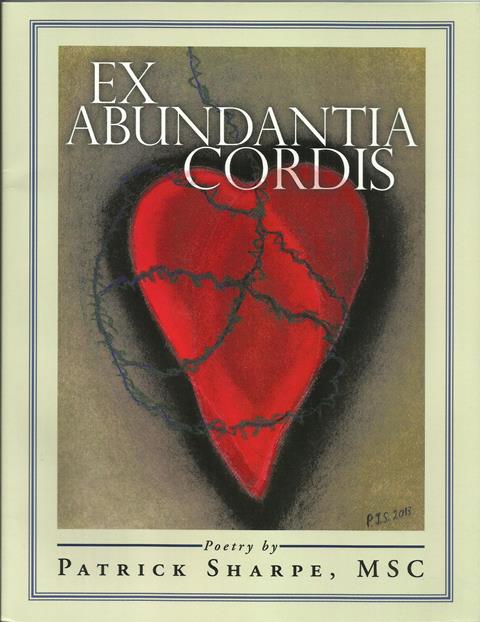
Zen Diary, The
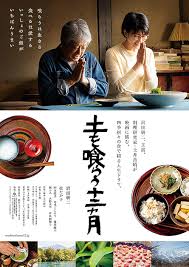
THE ZEN DIARY
Japan, 2022, 111 minutes, Colour.
Kenji Sawada, Fumi Dan.
Directed by Yuji Nakae.
This is a film adaptation of 1978 book, part fact, part fiction. Its central character, Tsutomu, ageing, widowed, but not having buried his wife after two years, lives alone on the mountaintop, cultivating vegetables. In his young days, he had been committed to a Buddhist monastery but had left at the age of 13. However, a lot of Buddhist principles and practice have remained with him.
While there is the Buddhist influence, the focus here is very much on the cultivation of vegetables, growing, picking, processing, preparing them with accurate in minute detail for cooking. For audiences who enjoy watching food films, there is a great deal of interest in the preparation, the cooking, the serving, the eating, and the explanations for the nourishment.
The film is quietly-paced, the routines of Tsutomu’s life, especially as the emphasis of the screenplay is on the changing seasons in Japan, the particular features, contributing to sowing, growing, harvesting.
Tsutomu is visited by a young woman, a publishing house agent, with whom he is in something of a relationship. Enjoys the visits, as does she, urging him about his writing but also sharing in the preparation of the meals and enjoying the.
He also visits his rather isolated and crusty mother-in-law, friendly, comparing notes, cooking, and listening to her complaints about her other family connections. And is visited by his in-laws who want to offload the problems with the crusty old lady on to him.
There is also the issue of his health, closeness and possibilities for death, his response to them.
The film is an invitation for audiences to enter into Japanese consciousness, Buddhist religious and cultural traditions, courtesies and respect, and the significance all some food and preparation and the effect for a healthy and prosperous life.
BL Metamorphosis

BL METAMORPHOSIS
And, 2022, 115 minutes, Colour.
Mana Ashida, Nobuko Miyamoto..
Directed by Shunsuke Kariyama.
Sometimes we miss out on trends in various cultures. In coming across the title of this film, the question was: what does BL stand for? A quick trip to Google: BL, also known as boys' love and its abbreviation BL (bīeru), is a genre of fictional media originating in Japan that features homoerotic relationships between male characters.
Apparently, it became popular in the 1970s in Japan, script to Thailand and other Asian cultures, featured in Manga stories and in Anime. And there was a dominance of women authors. So, an opening inquiring attitude as the film begins.
In fact, the main feature of the film is a friendly relationship between a lady in her 80s and a young teenager. Yuki, is seen looking for a cookbook and attracted by the cover of one of the BL groups that she sees on the shelf. She buys it, to the apparent concern of the young teenager serving in the shop. Yuki returns for more, befriends the young girl who, herself, is a fan of this kind of book, has a whole collection home, eventually lending some to Yuki.
They chat, they visit, there is a young man friend, discussions of the story, the style, the illustrations, the relationships between the young men, the young woman deciding to create a booklet, its being published by a publisher and his son who come to Yuki who has calligraphy lessons.
There is an chance encounter with the author of the first book – and happy connections, affirmations, friendships.
It still leaves the audience wondering about BL stories but in a very happy frame of mind.
- the title? The history of Boy Love in Anime Manga, from the 1970s, Japan, Asia? Female authors? Boy Love characters?
- The Japanese city, homes, bookshops, Manga conventions, the overall views and impressions of the city? The musical score?
- The opening, the heat, behaviours, the people crossing the street, Yuki and her hurry, looking for cooking books, discovering I Have had eyes Only for You, the attraction of the art, buying the book, you were at the counter, her surprise, the beginning of a friendship, a gentle encounter?
- Yuki’s story, age, two years widow, her prayer remembering her husband, her calligraphy classes, the printer and his son, keywords in calligraphy throughout the film, a reading the books, the surprise about Bully Love, her liking the drawings, the characters and their interactions? Buying more books, discovering the magazine? Her relationship with her daughter, the daughter’s visit, talk, drink, the possibility of moving in with her daughter?
- You are a story, her age, at school, 17, at home with her mother, her mother’s ambitions for further study, classes, the help from the boy, their friendship for many years, observing him with the girlfriend, the tensions with the girlfriend, the encounter with the Yuki, Yuki’s return, finding her more books, lending her own, reading her own quietly at home, a collection?
- The visits, the friendship, the kindliness, the discussions, you were and her loneliness, finding a friend? Her studies? The two love for Mango, you were and her ideas, sketching, school, the boys seeing them, encouraging her? And his later reading her book?
- The plan to go to the convention, you were and her studies? Meeting up again, the plan for the Manga book, the process for you were in drawing and writing it, encouraged to go on? The pressure of the dates? The self-publishing, Yuki and her encouragement, the printer and his son, the production of the book? You were and her shyness, not going? Yuki, unwell, the printer helping her, the breakdown of the car, the encounter with the author, the conversations, the author buying the book? Yuki not recognising her?
- The scenes with the author, who work, friend, discussions, her themes? The encounter with Yuki, buying you were this book? The buildup to the signing, you were and we, his dilemma about seeing his girlfriend off at the airport, asking you were to decide, their going to the airport, her hurrying back, in the queue, eventually getting her book with the sketch and autograph?
- Yuki, going to the signing, the conversation with the author, the drawing, the author recognising Yuki and telling her how the self-published book encouraged her? Yuki then telling you were, the joy?
- The finale, the happy achievement, the portrait of an unlikely lovely friendship, the sensitivity of the film, the builder, repairing the house, the curry…?
My Broken Mariko
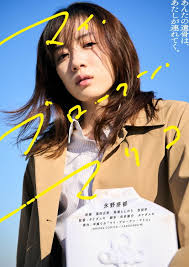
MY BROKEN MARIKO/ Mai burôkun Mariko
Japan, 2022, 87 minutes, Colour.
Mei Nagano, Nao Honda, Masataka Kubota, Toshinori Omi.
Directed by Yuki Tanada.
A story of friendship and sadness. The central character is a young woman, Shiino, who gets news of the suicide of her close friend, Mariko. She is distraught, wants to find out what happened, visits Mariko’s abusive father, steals the urn with the cremated ashes, takes them to the seaside town which was significant in their past.
There are many flashbacks to childhood, to teenage years, to Mariko’s traumas, the support from Shiino, attempts of relationships, mental anguish and mental conditions…
The other main character is a young man who encounters Shiino murders/bag has been snatched by bike rider. He is kind to Shiino, encounters her in her troubles, tells his own story, but intervenes when Shiino encounters the snatcher pursuing another young woman.
There is an upbeat ending of hope despite the sadness of Mariko’s life – and the criticism of Japanese patriarchy and domestic abuse.
- The title? Affection, suffering?
- The Japanese setting, apartments, working places, schools, streets, travelling train and bus, the town, the coast and the cliff? The musical score?
- The impact of the opening, Shiino, the meal, the news of Mariko’s death, the effect?
- Shiino and her story, at work, the clashes with the boss, his being insulting, her responses, the news of the death, going to the apartment, news of the cremation, the impact? Going to the house, meeting the father’s second wife, his prayers with the ashes, her vicious denunciation, taking the ashes, leaping away, through the water, back home? Her decision to go to the beach, which Mariko had liked, trip, buses and train, reading Mariko’s letters, the bag snatcher, the encounter with the kind man, the money, drinking, sleeping the boat, the encounter with the man again, suicidal, the bag snatcher pursuing the woman, her hitting him with the ashes, is three floating away, her injury, hospital, crutches, the man again and his kindness, the letter from the rescued woman, back to work, her boss demanding she continue to work? And finding the letters – from the woman? From the man? The future?
- Mariko’s story, her cruel father, abusive, sexually abusive, the effect? Her mother, exasperated, leaving? The impact of the flashbacks, Mariko at different stages of life, the physical bruises? The friendship with Shiino, at school, company, support, their friendship, the consolations, Mariko and her mental state, cutting her wrists, out with boys, liking one and his insulting her, continually confiding in Shiino, dependence on her, happy that Shiino accepted her? Her killing herself?
- The young men, on the road, helping Shiino, giving her the money, going fishing, discovering her on the boat, giving her food, on the cliff, saving her, his reappearance, the story of his attempted suicide, a nice and good man?
- The glimpse of Mariko’s father, the stories about him, seeing him praying with her ashes, Is Vicious response to Mariko? His new wife, her exasperation, leaving him?
- This film for Japanese society, especially for domestic abuse, father’s abusing daughters, mental states, suicide? And consolations of friendship?
I Am What I Am
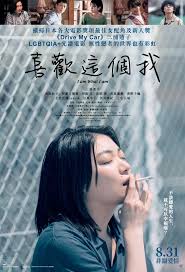
I AM WHAT I AM/ SOBASUKU
Japan, 2022, 104 minutes, Colour.
Toko Miura, Atsuko Maeda.
Directed by Shinya Tamada.
Katsumi is 30, works in a call centre, lives at home, the rather overbearing mother anxious for her daughter to be married, pressure from her married sister – this enquired affirmation from her rather depressed father.
The theme of this film is sexuality, specifically a sexuality, a condition which affects a small percentage of the population, men and women, who feel no sexual attraction in their lives and are content with this, except for its consequent loneliness. They want to live their own lives, not without friendships, but satisfied with their own interior lives. Most people do not understand this.
Katsumi is tricked by her mother into going to an encounter with the young man and his mother, in view of a possible marriage. A friendship seems possible with much in common but, eventually, he intrudes on her sexuality. She goes to a kindergarten is very effective with children, and a past friendship from school days with a man who has outed himself. She does meet another teacher sharing the same condition as self, going on a date to the movies bracket and each going to a different film!).
Finally, Katsumi assert herself looming to the beach where she often goes to sit in quiet contemplation, by herself and her own emotional situation.
- The declaration of the title? Identity? Sexual identity, asexual identity?
- The Japanese setting, homes, call centres, restaurants, beaches? The musical score?
- Katsumi, age 30, living with her parents, her pushy mother, her depressed father, the grandmother divorced three times, her pregnant sister, accusations against her husband? Katsumi, the request to learn the cello, her studies, leaving them, at the call centre? The sitting on the beach, the reappearance of this theme? Her mother urging her to marry, the shopping arrangement and the meeting with the prospective husband? Her reaction? The conversations with him? Friendly? Is one ambitions for his work? Her having eaten at the Raman restaurant? The opening, with her friend from work, the overbearing chatting men? The question about Tom Cruise, his running in The War of the Worlds, unlike the spy films running towards, this time running away? The repetitions of theme – and the finale with her running like Tom is one?
- The issue of sexuality, asexuality? Her explanations of her situation, personal, psychological, self-sufficient, introverted?
- The Raman restaurant man, friendship, travel together, the room, his approach, the kiss, his angry reaction? The effect on Katsumi? The encounter with Maho, school days, her breezy personality, celebrity, the porn star, anger with her father, his campaign and her interrupting it? The two comfortable together, the travels, the plan to share the apartment, her going to see an apartment, Maho and the revelation about the marriage, the effect, the invitation to give a speech of her wedding, the decision to play the cello, the playing, the applause and happiness?
- The symbol of the cello, conversations with her father, his depression, his brightening up, his exercise, meals, relationship with his wife, talking with Katsumi about the cello, his happiness, accepting her giving it up?
- The meal, her sister and the accusations against her husband, his explanations, the reaction of each of the family, Katsumi and her upset, her explanation about the situation?
- Leaving the call centre, going to the school, her relationship with the children, the games, listening to their rather adult relationship problems? Her friend from the past, working with him, his outing himself?
- The significance of the postcard presentation, Cinderella, Maho narrating, urging a different perspective, Cinderella as independent, the fulfilment was not marrying the prints? Her cutting it off, later meeting with the teacher, his not being sociable with the group, the date with the movies and each going to a different film? The discussions?
- The title, the reality of asexual men and women, the small percentage, criticisms from straight and gay, the need for respect, emotional independence? Identity?
Way, My Way, The
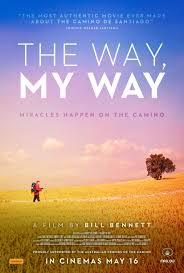
THE WAY, MY WAY.
Australia, 2024, 100 minutes, Colour.
Chris Haywood, Laura Lakshmi, Pia Thunderbolt, Jennifer Cluff.
Directed by Bill Bennett.
It is amazing how well-known and popular the Camino di Compostela has become. Originally, a Catholic pilgrim devotion, it is now walked by a wide range of pilgrims, religious, spiritual, secular…
Already in 2011, there was a feature film, The Way, where actor Emilio Estevez directed his devout Catholic activist father, Martin Sheen. As expected, it followed a varied group along the scenic route as they discussed, pondered their lives, experienced some deepening of self-awareness.
It is
While The Way featured fictitious characters, in 2015, there was a documentary feature, Walking the Camino to Santiago, where the director of the film joined actual pilgrims, sharing the journey with them, giving background to the Camino, explaining some of the religious context as well as practices.
In 2013, Australian writer-director, Bill Bennett, who had been working in film and television since the 1970s, with films like A Street to Die, walked the Camino and published a book of his experiences. It has taken a decade for him to get his memoir to the screen. He has written the screenplay, has cast veteran actor, Chris Haywood, with whom he had worked long since, as a film-maker named Bill, married to Jen for 41 years. She is played here by actress, Jennifer Cluff, Bennett’s wife of the last 40 years, who also served as a producer.
Chris Haywood is a familiar figure from many movies since the 1970s. He is not exactly young to be setting out on the Camino. He is not a believer but, on a visit to Spain, sees the pilgrims, reminding him of lemmings on their way to the cliff edge. He chats. He asks questions. And returning home, this stays with him quite powerfully, curiosity, intrigued, obsessive and deciding to go himself. He closely studies the maps, descriptions, meticulous about his pack, the weight, relationship to his body weight, the possibilities for walking – and practising with long and longer walks in the countryside.
He is also grilled by Jen, trying to get strongly-felt answers from him. Then, an economy flight (and his complaints) to Biarritz, sharing a taxi with three others, beginning the Camino.
The screen informs us throughout which day it is, how many kilometres he has walked, how many to go, the 780 total.
For those who have walked, plenty of scenery, countryside, towns, hostels that they will remember. And there is a lot of information and cautions for those intending to walk. As expected, with Bill’s voice-over comments about the walk, his very bung knee, about fellow-pilgrims, invites us to share his experience, his moods, confusions. And there is his questioning and his personal self-revelation about simplicity in life, an apology to Jen, who admits he is a very difficult man but she loves him.
Also, as expected, Bill encounters nine pilgrims, older rather than younger, two exuberant men from Hungary, thoughtful direct Dutch woman, a sympathetic Italian couple, a sad Spanish woman who broods, a young Asian man, and a Scots former business CEO. As they walk, encounter each other at times along the way, share their lives, those great deal of warmth and friendship.
The pilgrims are ordinary people and Bill Bennett is telling his story for an ordinary audience, inviting them to identify with Bill and the others. There are some specifically religious references, especially a moving “confessional” sequence, some happy meditative moments in the Cathedral of St James.
The Way, My Way is an invitation to reflection for people of faith or not – an invitation to a spiritual experience.
The Way, My Way is an invitation to reflection for people of faith or not – an invitation to a spiritual experience.
- The popularity of the Camino de Santiago? The long tradition, the Middle Ages, pilgrims, the Cathedral of St James and relics?
- Audience knowledge, popularity in the 21st-century, documentaries, films?
- This film based on personal experience, the writer-director, his pilgrimage in 2013, the effect on him, his writing on the Camino, getting the film to the screen? The screenplay, the main character filmmaker, Bill, his wife, Jen, 40 years married? The parallels with Bill Bennett and his wife, Jennifer Cluff?
- Bill, in Spain, seeing the pilgrims as lemmings, his curiosity, the questions, returning home, the secular perspective, puzzle, more and more obsessed, walking practice, meticulous preparation, maps and books, his pack and wait…? Jen and her questions and his answers?
- Flying to Biarritz, complaining about economy class, meeting up with the Hungarians and the Dutch woman, the taxi, accommodation? Jen imposing a limit on his first day, his phone calls, dilemma, breaking the resolution?
- The film detailing which day, distances from the start, distances to Compostela? The range of countryside, and Bill starting on the wrong road, catching up, the range of hostels and accommodation, shared, meals? Buildings, the towns, the churches?
- The range of pilgrims and Bill’s interactions? The cheerful Hungarian, religious dimensions, business abilities? Companion will? The second Hungarian, Bill and his knee, lending the jacket, the ice? The various helps? The Dutch woman, friendly, direct in her expressions and opinions? Challenging girl? The Italian couple, their past experiences, testing Bill, his not getting a taxi? The Scot, the CEO, sitting and meditating, the conversations, the revelations, is measured pace? The young Spanish woman, the encounter with her, in the church, Bill acting as a confessor, her story, reconciliation, self-forgiveness? The young Asian man, taking the photo, the later conversations?
- Along the way, the comedy of Bill and demanding no head space and the photos, the range of photos, this recurring theme? His own photos?
- Bill, age, health, his knee, needing to rest, the ice, the treatment, medication? The various pilgrims and their contribution?
- The voice-over, Bill’s reflections, puzzles, the impact of the people, the long silent walking, the countryside? Spiritual dimensions, self-reflection? The Scot and the explanation of simplicity, carrying all one needs for life?
- The phone calls to Jen, communication, concern, arriving Compostela, her presence and the reunion?
- Happy times, getting to know people, the time available while walking, to reflect, to put busy life in perspective?
- The religious value of the Camino, the spiritual value of the Camino for all those who walk it?
Old Henry
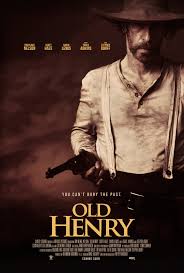
OLD HENRY
US, 2021, 99 minutes, Colour.
Tim Blake Nelson, Scott Haze, Gavin Lewis, Trace Adkins, Stephen Dorff, Richard Speight Jr, Max Arciniega.
Directed by Potsy Poncirolli.
There is an interesting and entertaining reveal at the end of this film for those who do not recognise Henry McCarty. For those who do, the film is an interesting piece of creative history.
This is the changing west. It is 1906. Three men with sheriffs’ badges torture and hang a man for information and then pursue another. And then we are introduced to Henry McCarty, a wonderful performance by long-time character actor, Tim Blake Nelson. His voice-over explains his background (though a lot more to be revealed by the end of the film). He is widowed. He has a teenage son who is angry with him, wanting some independence from his rather stern and commanding, hard-working father.
They discover the pursued man, wounded, a gun, a sack full of money. They tend to him. But, as expected, the posse turn up, confrontations, the abduction of Henry’s brother-in-law, the posse hiring guns from the local town.
The odds seem impossible. The pursued man joins in the defence. So does the son. However, quite spectacularly in its way, Henry is able to dispose of the whole posse. And, then the reveal.
A small Western, not so well-known, emerging and the Covid era, but well worth seeing, a continuation of Western themes.
- The title, Henry McCarty, the final revelation of his identity?
- The mood of the opening, the posse, sheriffs, the torture and hanging of the fleeing man? The continued pursuit?
- The contrast with the introduction to Henry, his wife’s grave, with his son, Wyatt, the continued work, the son’s rebellion, the impositions of his father? The detail of the farm work? The boy wanting his independence?
- The wandering and bloodstained horse, Henry and his search, finding Curry, the money, decisions? Bringing him back, tending his wound, hiding the stolen money, Wyatt spying on his father? Henry going to the doctor, Wyatt taking the gun and shooting practice? The posse and Henry’s return?
- The membership of the posse, Ketchum as leader, brutal, the Spanish scout and his skills, the confrontation with Henry? Backing off?
- Tending Curry, consciousness, explanation who we was, the law? The others as bank robbers? His telling the story of his background, Henry believing him, feeding him, freeing him?
- Dugan, impatient, scouting the house, the shooting, Henry outwitting him, feeding him to the pigs?
- Preparation for the siege, Ketchum returning with the posse, the confrontation, the talk, the plot? The shooting? Curry wounded, Wyatt wounded? Henry going out, single-handed, destroying each member of the group, the scout and his surrender, death, Henry running, Ketchum in pursuit, confrontation?
- The phone with Curry, revealing his true self, the memories of Billy the Kid, stories, he shooting Henry?
- A saga of the west? And the tie in with the stories of Billy the Kid?
Radical

RADICAL
Mexico, 2023, 125 minutes, Colour.
Eugenio Derbez, Daniel Haddad, Jennifer Trejo, Mia Fernandez Solis, Danilo Guardiola Escobar.
Directed by Christopher Zalla.
Potential?
Recognising potential, encouraging opportunities, creativity?
Radical is a film about education. It is set in a Mexican town, 2011. The screenplay is based on an article in the magazine, Wyatt, by Joshua Davis: A Radical Way of Unleashing a Generation of Geniuses 2013. The article was based on a teacher and experiences in 2011. And, audiences will begin to remember films on creative education that they have appreciated in the past, the personal touch with To Sir, With Love, or the creativity of Dead Poets Society.
The action is situated in a seaside Mexican town, poor and undeveloped, mothers working night shifts, a father owning his living by fossicking in a mountainous rubbish tip, dead bodies on the streets… This is the background for the children who go to the local school. The principal is frustrated, is school getting some of the lowest assessments in the annual tests, a disgruntled staff who are ready to cheat by getting the test cancers early and rigging the results, corruption in the offices in the local city, promises of computers but there never being delivered…
Then comes the new teacher, Sergio, played by popular actor Eugenio Deberz, full of creative vitality. He has worked in the system, become disillusioned with students not appreciating their education, determined to find creative ways, especially for the top year in primary school.
We, the audience, are immersed in his methods, perhaps sharing the initial stunned silence of the young students who really do not know what he is asking of them, but, gradually responding, his asking questions, is one speculating, experiments, different seating in the classroom, out into the schoolyard to test their ideas – the initial question concerns flotation, density and weight, perhaps a challenge to many of us in the audience, but with growing zest, teacher and principal in bathtubs to check floating, we see that this experiential way of learning means that the knowledge is personalised.
The film shows Sergio and his zest, his communicating it to the rather large principal who becomes more and more sympathetic. The screenplay highlights three of the students, Paloma, who helps her widowed father collect metal scraps but who has a love for physics, astronomy, and telescope, and that keyword: Potential. There is Nico, forced by his brother to be a drug courier, even at school, low self-esteem, encouraged by Sergio, discovering a love for learning, and a terrible dilemma in facing the gang. There is also, Lupa, her parents on night shift, her caring for the two younger children, her mother pregnant, managing the household – and Sergio responding to one observation by mentioning the word philosophy which sends her to libraries, and her discovery a love of reading, of thinking through moral issues.
Most audiences have found the film positive, heartwarming, hopeful – and some dissenters who are wary of sentiment and are keen to label this kind of film as kitsch. But, Radical is definitely a film for most audiences.
- The title of the basic article, A Radical Way of Unleashing a Generation of Geniuses?
- Mexico, 2011, town, poor, artwork, drug gangs, deaths in the streets, families, the school? The musical score?
- The introduction to the town, the boy wheeling his grandmother (and the film ending with his still looking in, not able to go to school)? Emerged out of the way, the speeding vehicle, dragging the prisoners? The tone?
- Lupa and her family, father’s work, mother on night shifts and getting out in the morning, her mother pregnant again, the two little children, and keeping the household, preparing the breakfast? Taking the children to school?
- Nico and his brother, the hut, by the sea, voting disrepair, his being a courier with the drugs, on the bike, exchanging packs, feeling an outsider?
- Paloma, her ailing father, on the vast tip mountain, scavenging, the donkey, taking the goods to the dealer, her challenging him with the payment?
- The school, the principal, his role, the demands, getting to like him throughout the film, the staff room, the hostility to Sergio, the exam tests and cheating with the results? Spurning Sergio?
- Sergio, his personality, arrival, references from the previous school, his explanation that he had lost the support of children, wanting to start afresh, in a poor situation? His philosophy of teaching, getting the children into action, the personal touch, asking them questions, telling them stories, arousing their curiosity, getting them to investigate, experiments? The initial stunned silence, arrangement of the desks, their surprise, the questions about flotation, their speculations, thinking about them, testing balloons, the weight of Sergio compared with the weight of the principal, density, the principal joining in the experiments? The learning?
- Sergio, his story, his wife and young child, at home, his confronting the corrupt authorities, the company to the school, inspecting, challenging, Sergio suspended, retreating for two weeks, the principal coming to get him to come back? Seeking the children?
- The issue of the computers, the promise, non-delivery, corruption issues, the expert coming, talking over the heads of the children? Sergio and the principal’s phone and his illustrating his theories?
- Nico, the pressure from his brother, the gang this? Belonging? At school, spurned, thinking badly of himself? Attraction to Paloma? The question to Sergio? Sergio giving him the brochure, his giving it to her, her discovering the truth, yet the bonding between them, sharing, showing him the telescope? His change of heart, wanting out of the game, wanting to go to school, repairing the boat, La Paloma?
- Paloma, maths, physics, very clever, creating the telescope, finding the mirror, using it? The magazines, hiding them, her father then discovering her notebooks, his previous talk with Sergio and condemning him for promising what he could not deliver, his change of heart?
- Looper, her questions, Sergio mentioning philosophy, are going to the library, John Stuart Mill, reading the books, wanting to read more, the moral questions, Inspector and the discussion about abortion, contraception? His wanting answers for the test, Nico failing, Paloma and Looper and send the questions?
- The crisis, Nico wanting out, the threat by the boss, the gun, the shooting, Nico did, the otheris dead, Lupa in fear, Paloma and her grief?
- The final test, Paloma deciding to come, Lupa still at home, her mother promising more education when the little boy reached kindergarten? Success? Disappointments? Tragedies?
- The final information, 2012 excellent results, and the photos of Paloma and the others?
Ordination, Toan Dinh Vinh MSC, Nagoya, Japan
Ordination, Toan Dinh Vinh MSC, Nagoya, Japan
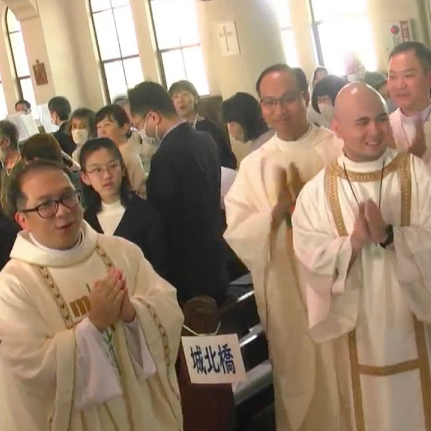
Toan Dinh Vinh: Toan ordained a priest,
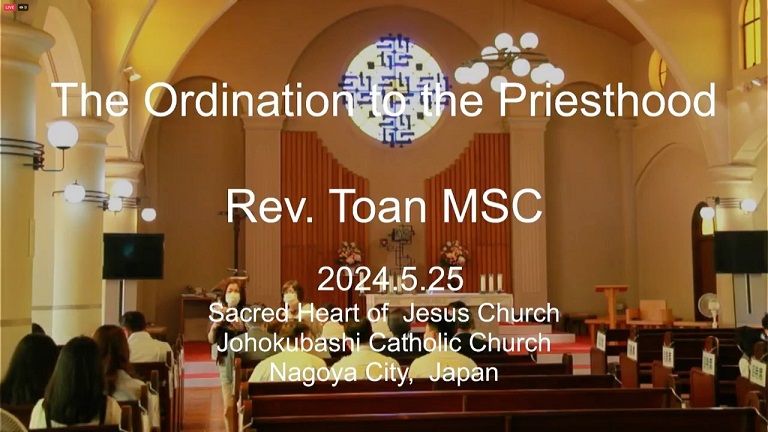
Saturday, 25th May, at 2:30 p.m. in Johokubashi Church, Nagoya.

It is the first MSC ordination in Japan in 39 years.
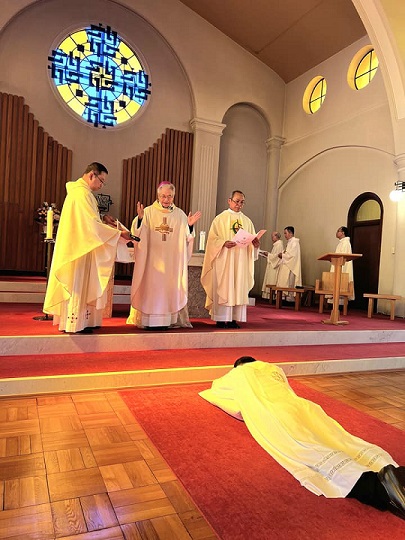
On Sunday morning, a mass of thanksgiving in Japanese was celebrated,
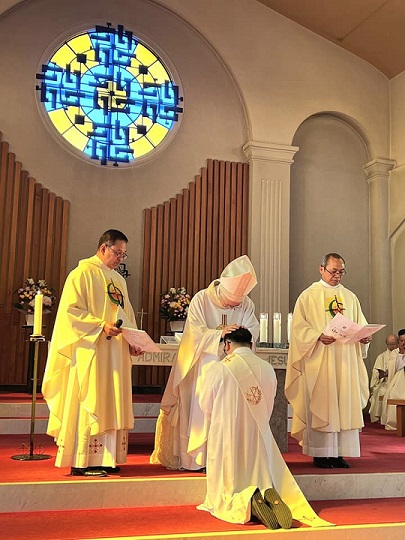
and in the afternoon, a mass in Vietnamese celebrated at the same location.
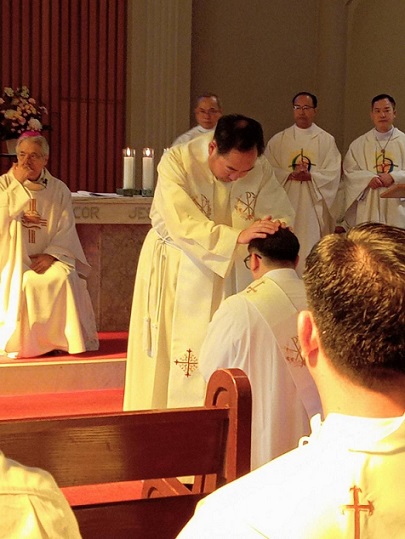
The ordaining Bishop is Bp. Goro Matsuura (Nagoya Diocese).
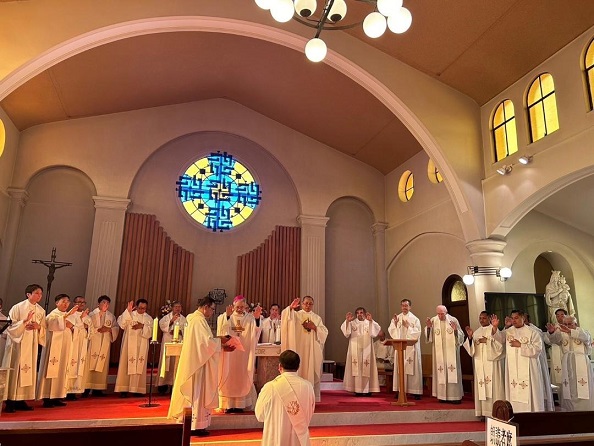
Toan, you are in our prayers on this special celebration.
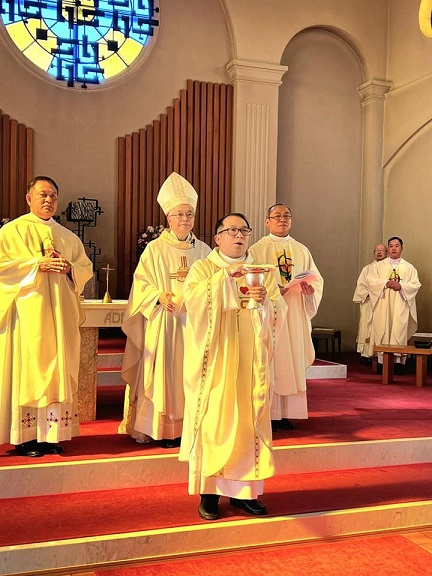
A wide selection of photos, from Kenji, photos by the parishioners
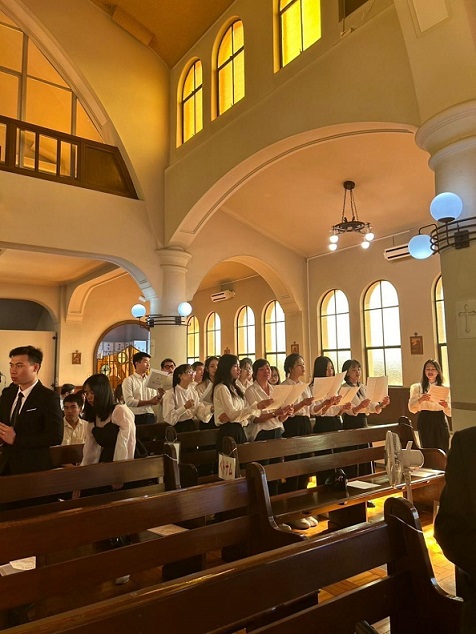
Screen shots of the ceremony by John Walker

And some further photos from Stephen Hackett.
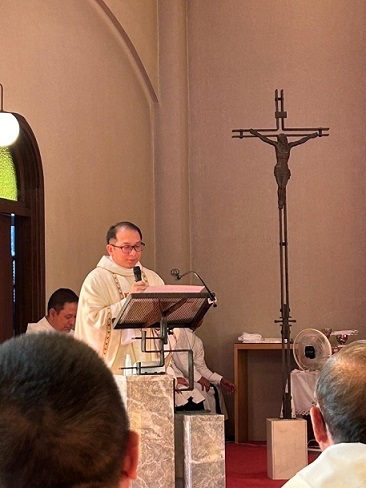
And we received two photos of the whole group, but not sure which is better, so we are posting both!

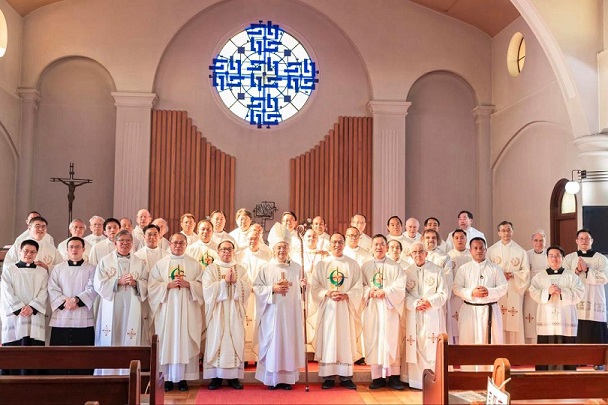
National Reconciliation Week, May 27th – June 3rd
National Reconciliation Week, May 27th – June 3rd
After last year’s referendum result, this week is needed more than ever.
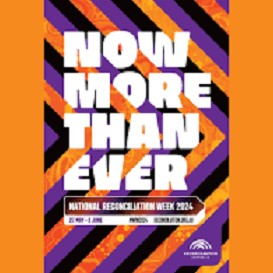
Disregard of Aboriginal prior rights to land was the ‘root of all evil’ in the colonisation of Australia.Archbishop Polding, Sydney, Pastoral Letter, 1869
The Missionaries of the Sacred Heart Australia have a long history with the First Nations People of this land and are committed to Reconciliation.
To foster that commitment, you might like to read this list and remember:
Darwin
Tiwi Islands
Arltunga/ Santa Teresa
Wadeye/ Port Keats
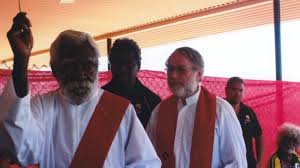
Deacon Boniface Perdjert
Nauiyu/ Daly River
Nelen Yubu Missiological Unit/ Daly River
Nelen Yubu periodical
Parishes
Darwin Cathedral

Alice Springs
Nightcliff
Casuarina
Katherine
Tennant Creek
Torres Strait
Hammond Island
Thursday Island
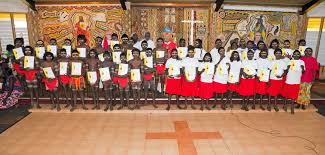
Wadeye
Wilcannia/ Menindee
Palm Island
Erskineville/ ACM, Aboriginal Catholic Mission
The MSC Brothers, Priests, Bishops, the Daughters of Our Lady of the Sacred Heart, the Lay Missionaries
And students in our schools, especially St John’s Darwin,
Students at Downlands, Chevalier, Monivae, Daramalan
- And at Monivae, Mick Dodson,
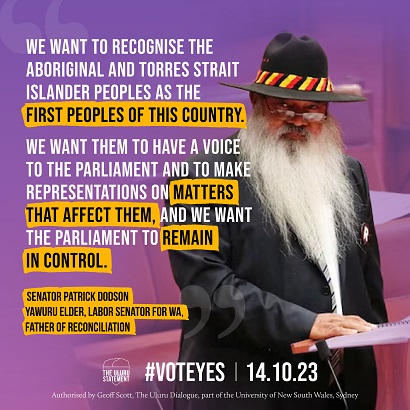
And acknowledging Pat Dodson, sharing 15 years of MSC life with us,
And his being named in 1997 The Father of Reconciliation


